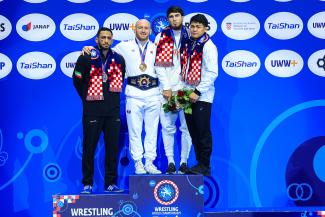Transcript: Interview with Sadulaev
Wednesday, April 8, 2020 - 13:14 By United World Wrestling Press
Q: Is it your goal to win three Olympic titles like Satiev and Karelin?
Talking about 3-time Olympic champions Saitiev and Karelin, it's great that we have such examples to follow.
For now, it's useless to consider winning my third Olympic title because World Championships are different from the Olympic titles. Anybody can win and anybody can lose. My main goal for now is my second Olympic title and then I will concentrate on the third one.
Q: How have stayed on top for so long?
Motivation helps me achieve everything. My rivals are training hard as well. They don't stand idly by. The younger generation is coming. Sport just takes a short period of our life. I have to win every possible tournament, before the younger wrestlers start stepping on my toes. Otherwise it will be too late.
Q: What do you think about a potential matchup with J’Den Cox?
I think, J'den Cox has a specific wrestling style. However, Snyder will not be easy to beat, he is a current Olympic Champion. And he's a lot bigger than Cox. As it is said, we will see what happens on the mat. I'm interested in seeing them wrestling against each other.
I don't really know how the match between me and Cox will go, because we've never wrestled. At the Olympics we ended up in different brackets, I changed my weight category, but he stayed at the same one. We have never met on the mat.
Q: Why are there so many great wrestlers from Dagestan?
In Dagestan, wrestling is in our blood, It's basically our National Sport here in Dagestan it's the number one sport. Almost every boy takes part in freestyle wrestling. So, there's a lot of competition between them. That's why so many Dagestani wrestlers represent different countries, because they can't qualify for the Russian national team.
High competition benefits good wrestlers.
Q: How does it feel to be the first wrestler with one million followers on Instagram?
Even though I have one million Instagram followers, it wasn't my main goal. If I was truly interested in it, I would have got there much faster. I'm not very active on social media. Of course, I am pleased that people are interested and that they follow me.
Q: How do we continue to grow the sport of wrestling?
The growth of the sport and wrestling is very important. Recently, wrestling was overtaken in popularity by MMA. But still, wrestling remains as an Olympic discipline. That's why I think, wrestling should be spread all around the world. In general, in MMA almost all the fighter have some sort of wrestling background -- around 70% of the top UFC fighters are former wrestlers. That's why wrestling is so powerful
Q: How do you want people to remember you when you retire from wrestling?
The most important thing is to leave a good legacy so that no one would dare to tell my children or grandchildren -- that their father wasn't loyal or a bad person. Once again, it's important to leave a good legacy.


Share your thoughts.
Comments